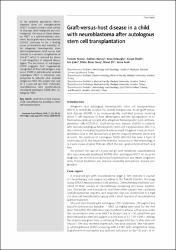Graft-versus-host disease in a child with neuroblastoma after autologous stem cell transplantation

Göster/
Erişim
info:eu-repo/semantics/openAccessTarih
2019Yazar
Yaman, YöntemBaysoy, Gökhan
Keleşoğlu, Emre
Özdilli, Kürşat
Çakır, Aslı
Genç, Dildar Bahar
Elli, Murat
Anak, Sema
Üst veri
Tüm öğe kaydını gösterKünye
Yaman, Y., Baysoy, G., Keleşoğlu, E., Özdilli, K., Erdoğan Çakır, A., Genç, D. B. ... Anak, S. (2019). Graft-versus-host disease in a child with neuroblastoma after autologous stem cell transplantation. Wspolczesna Onkologia-Contemporary Oncology, 23(1), 59-62. https://dx.doi.org/10.5114/wo.2019.83815Özet
In the pediatric population, hematopoietic stem cell transplantation (HSCT) is used to treat a wide variety of diseases, both malignant and nonmalignant. For many of these diseases, HSCT is a well-established treatment. Acute graft-versus-host disease (GVHD) continues to be a leading cause of morbidity and mortality after allogeneic hematopoietic stem cell transplantation. Graft versus host disease is a common complication of allo-SCT which is induced by donor T cell recognition of recipient alloantigens. The occurrence of autologous GVHD suggests that inappropriate recognition of host self-antigens may occur. GVHD in patients who received autologous HSCT is extremely rare compared to patients who received allogeneic HSCT. We present the case of a 4-year-old girl with metastatic neuroblastoma who spontaneously developed autologous GVHD after autologous HSCT.
Scopus Q Kategorisi
Q3Kaynak
Wspolczesna Onkologia-Contemporary OncologyCilt
23Sayı
1Koleksiyonlar
- Makale Koleksiyonu [3651]
- PubMed İndeksli Yayınlar Koleksiyonu [4050]
- Scopus İndeksli Yayınlar Koleksiyonu [6286]
- WoS İndeksli Yayınlar Koleksiyonu [6433]

















